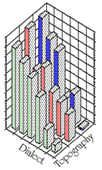 |
 |
[Excerpt from J.K. Chambers, Sociolinguistic Theory: Linguistic Variation and Its Social Significance, 2nd Edition. Oxford: Blackwell Publishers, 2002): Chapter 4.]
4.6.1. Age-grading
Age-graded changes are usually thought of as changes in the use of a variant that recur at a particular age in successive generations. They are, then, regular and predictable changes that might be thought of as marking a developmental stage in the individual's life.
Very few changes of this kind have been reported. The [one] that I will cite here take[s] place in adolescence. Thus the early variant might be thought of as a marker of children's speech. Its elimination or reduction in the speech of individuals normally takes place without conscious effort on their part, and the linguistic effect of the change is minor, but it is no doubt one of the dozens of miniscule changes that contributes to the perception of their maturity in the view of parents, teachers, and other adults.
4.6.1.1. Zee and zed in Southern Ontario.
The first example is probably more interesting socially than linguistically. In Southern Ontario, the southernmost part of Canada and also the most populous, the proximity of the United States on three sides makes the American presence a constant factor, and one that Canadians feel compelled to resist in order to keep their autonomy. Their resistance involves matters both large and small.
One of the small matters is the name of the last letter of the alphabet. 'Z' is called "zed" everywhere in the world, not only in English but also in French, German, and most other languages, except in the United States, where it is called "zee". Hence "zee" is an American shibboleth.
In Southern Ontario, the pronunciation of Z as "zee" is stigmatized, as might be expected. American immigrants to the region, numbering several hundred annually, routinely report that their name for Z is one of the first things they change after arriving there, because calling it "zee" unfailingly draws comments from the people they are talking to.
Nevertheless, some children in Southern Ontario learn the American name and use it for several years. Lexical surveys in the region repeatedly show a higher proportion of young people with "zee" than of older people. In a Toronto survey in 1979, two-thirds of the 12-year-olds completed their recitation of the alphabet with "zee" but only 8% of the adults did. In 1991, when those 12-year-olds were 25, another survey [the Dialect Topography of the Golden Horseshoe] showed that 39% of 20-25 year-olds said "zee". Obviously, a large number of them had changed their pronunciation in the interval, but it is also obvious that even more of them would eventually change, because only 12.5% of the people over 30 in that same survey said "zee".
The pattern of declining use of "zee" as people grow older repeats itself in succeeding generations in Southern Ontario. Its high frequency in the speech of young people does not persist, as it would if the standard name were changing from "zed" to "zee." Instead of marking a change in progress, the high frequency decreases as the generation grows older. It is therefore an example of an age-graded change.
With the use of "zee" stigmatized, it is perhaps strange that children should learn it at all. One source is pre-school television shows beamed from the United States, notably one called Sesame Street, which was almost universally watched by children in the 1960s when it had no serious rivals. Hence the extraordinarily high frequency of "zee" among those 12-year-olds in 1979. Sesame Street and its imitators promote the alphabet with zeal, almost as a fetish, thus ensuring that their young viewers hear it early and recite it often. The "zee" pronunciation is reinforced especially by the "Alphabet Song," a piece of doggerel set to music that ends with these lines:
Something like the power of rhyme must have been involved in propogating the American pronunciation in Southern Ontario in earlier generations, because the zee/zed issue antedates television and even radio. The issue was raised as early as 1846, when a person named Harris complained about it in a letter to a newpaper editor, saying, that "the instructor of youth, who when engaged in teaching the elements of the English language, direct them [the students] to call that letter ze, instead of zed, are teaching them error" (Chambers 1993: 12).
Even today, newspaper stories regularly spread mild alarm in their Southern Ontario readers with stories reporting the high frequency of "zee" among schoolchildren and inferring from that the spectre of American domination. It is a story that can be written over and over again, generation after generation, unless the newpaper readers come to understand the sociolinguistic difference between a change in progress and an age-graded change. Since that does not seem imminent, newspaper editors will no doubt keep on assigning the story to cub reporters any time they face a slow news day.
 |
 |